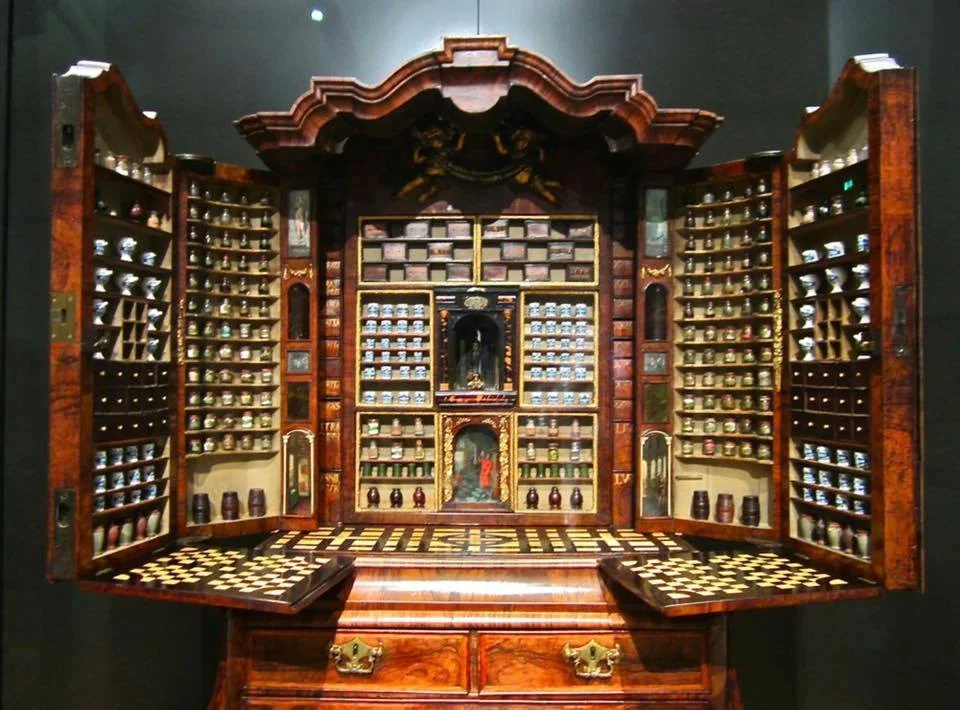Apothecary's Cabinet, 1730,.jpg The little Apothecary I aspire to creating!
Planning a herbal tea garden
Oh my!
In deciding to become a hobbyist herbalist at my new location in Lincolnshire, I now know that I have opened Pandora’s box. Unwittingly I have already begun to grow a home medicine garden in my garden. The next step in deciding to build a little apothecary of my own is to learn about the health properties of each of them and how to prepare and use them to unlock their medicinal qualities.
I want to use natural remedies in the form of herbs to keep myself and my family healthy as according to my research so far I have a complete pharmacy in my garden! I need to move out of my comfort zone and embrace the use of my herbs to make herbal remedies. I want to learn how to make my own herbal medicine chest by processing my herbs. I want to make my own herbal first aid, health and beauty products right here at home at The Yorkshire Preservatory in Lincolnshire. By finding out how to prepare basic applications often used in herbal medicine such as teas, capsules, poultices, syrups, tinctures, infused oils, ointments, balms, and salves I hope to have my own little apothecary containing recipes and concoctions that will keep me and my family brimming with health. I can’t wait to get started.
“Every home should have a Herbalist - Dr John Christopher”
As I said in my previous blog, I am fairly confident in my choice and use of herbs in my cooking and as friends in the vegetable garden. However, when it comes to using them as herbal remedies I am only really sure how to use them to benefit the health of my chickens! Often when I have looked to see how to use my herbs to improve my health, I have been overwhelmed by the amount of information written about their medicinal properties . I know people have used herbal remedies for centuries to heal common ailments, There are also many guides that tell you what ailment each herb will help alleviate. You can read whether the herb has anti-inflammatory antibacterial, anti-spasmodic, anti-allergenic, muscle relaxant, sedative, anti rheumatic, expectorant, hypertensive, or calming properties to name just some of their benefits. You can also read about the many nutrients they contain such as; vitamin C, vitamin B6, thiamine, riboflavin, calcium, iron, potassium, manganese. vitamin A and numerous other minerals and vitamins that they may be a particular good source of. What I really want to know though is which part of the plant should I use and how should I prepare it to maximise its health benefits whilst avoiding any adverse effects. The more I read, the more complicated it becomes. Sometimes, I feel, a little knowledge is a dangerous thing.
I need a plan! I can almost hear my herbs growing each time I swish past them in the gardent. The lemon balm is cascading over the path, the chives are ready to explode into flower; ! I need to do something that is relatively easy and very quick.
Like Poirot, the famous Belgian detective, I have found the solution. TISANES. Or rather Herbal Teas.
Drinking herbal teas are a simple way to access the health benefits of herbs.
What better way of improving mine and my family’s health naturally than by “brewing up”. In looking at different preparations of herbs, one of the great benefits of drinking herbal teas is that the vitamins, minerals and other nutrients appear to be readily available for your body.
John Staughton (Feb 2019) explains all in his excellent article 15 Best Herbal Teas & Their Health Benefits. Along with outlining the medicinal properties of herbs, extolling their common health benefits which include; relaxing the body and mind, aiding sleep disorders, reducing inflammation, easing pain, protecting against common diseases, boosting the immune system, optimising the digestive system, detoxifying the body, and stimulating cognitive function, he also unravels for me the mystery of what antioxidants, diuretics, anti-inflamatories, analgesics and more are, which herbs they are found in, and how to use them in different preparations including tea.
Of the herbal teas listed I am going to try:
Anise Tea – Excellent for stomach disorders, excess gas, nausea, congestion, coughs and colds, and painful menstrual cramps.
Echinacea Tea – Boosts the immune system, protects the skin from infections, and eliminates inflammation in the body.
Chamomile Tea – Has relaxant properties, soothes the stomach, and improves symptoms of back pain, inflammation, arthritis, skin irritation, and sunburn.
Peppermint Tea – Particularly good for easing cramps, stomach upset, indigestion, and excess gas, while also stimulating the immune system.
Thyme Tea – Known for breaking fevers, treating coughs and colds, boosting immune responses, soothing the stomach, and knocking out headaches.
Rosehip Tea – Very good for the immune system, due to high vitamin C levels, and can also detoxify the body.
Turmeric Tea – Stimulates antioxidant activity in the body, has anti-cancer potential, soothes inflammation, and promotes good digestion.
Of course it is important to remember that I am not a doctor and the statements on this blog are based on my personal opinion. Any herbs mentioned are not intended to treat, cure, or prevent any disease.


